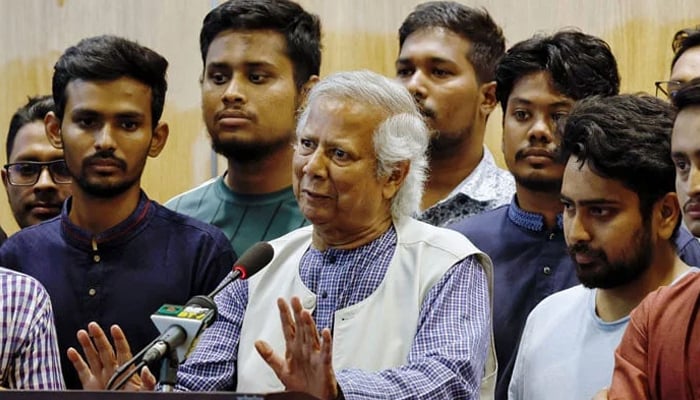BD unrest linked to resistance against Indian influence
Islamabad:During a discussion, experts linked the current unrest in Bangladesh to high unemployment, administrative issues, and resistance to Indian influence, and highlighted the challenge faced by interim Bangladeshi leader Muhammad Yunus to develop an effective and indigenous response to the complex situation.
Emphasising that Pakistan and Bangladesh have aligned interests, they urged both countries to work together for mutual benefit. The dialogue on ‘Transition in Bangladesh: Emerging Domestic and Regional Scenario,’ was held at the Institute of Policy Studies (IPS) here with chairman Khalid Rahman in the chair. The panellists included former ambassador Afrasiab Mehdi Hashmi as the keynote speaker, and former ambassador Rafiuzzaman Siddiqui. Both have served as Pakistan’s high commissioners to Bangladesh.
Afrasiab noted that after student-led protests against civil service job quotas led to the resignation of Prime Minister Sheikh Hasina and installation of Nobel Peace Prize laureate Muhammad Yunus as the head of an interim government, Islamabad had an opportunity to reassess and strengthen its ties with Dhaka. He noted that Bangladesh might have grievances with Pakistan, but there was no deep-seated animosity.
The former ambassador said resistance to Indian influence had been growing in Bangladesh. "Although the situation is still unfolding, it has sparked concerns in India, particularly about the potential resurgence of the Jamaat-i-Islami and the Bangladesh Nationalist Party."
Afrasiab said Bangladeshis also feared that India, in view of strategic interests, could employ various tactics to influence the country’s political landscape, particularly to prevent the rise of those groups due to their historical stances and perceived anti-India sentiments. He also said as India, under the BJP and Modi, had been characterised by a radical nationalist agenda, its political direction and approach toward neighbouring countries, including Bangladesh, are increasingly being questioned. The other speaker, Rafiuzzaman, stressed the need for and importance of adopting a balanced and watchful approach in response to the emerging situation.
-
 King Charles Takes A Major Step To Keep Horrified Prince William Out Of The Loop On Andrew: Insider
King Charles Takes A Major Step To Keep Horrified Prince William Out Of The Loop On Andrew: Insider -
 Taylor Swift Set To Make Biggest Cut From Her Wedding Guest: Blake Lively Or Ryan Reynolds
Taylor Swift Set To Make Biggest Cut From Her Wedding Guest: Blake Lively Or Ryan Reynolds -
 Prince William Meets Saudi Crown Prince Mohammed Bin Salman
Prince William Meets Saudi Crown Prince Mohammed Bin Salman -
 Brooklyn Beckham Brutally Cuts Off Inner Circle Amid Feud With David, Victoria
Brooklyn Beckham Brutally Cuts Off Inner Circle Amid Feud With David, Victoria -
 Kaley Cuoco Reveals Why Fiance Tom Pelphrey Sleeps In Seperate Room
Kaley Cuoco Reveals Why Fiance Tom Pelphrey Sleeps In Seperate Room -
 Ghislaine Maxwell Will Not Answer Congress Questions On Epstein
Ghislaine Maxwell Will Not Answer Congress Questions On Epstein -
 Kensington Palace Announces Prince William's Arrival In Saudi Arabia
Kensington Palace Announces Prince William's Arrival In Saudi Arabia -
 ‘Andrew Crisis Follows King Charles Everywhere Now’
‘Andrew Crisis Follows King Charles Everywhere Now’ -
 Jennifer Aniston Already Decided Her Wedding Dress?
Jennifer Aniston Already Decided Her Wedding Dress? -
 Prince Harry, Meghan’s Hollywood Party Drama Exposes Chaotic PR Strategy
Prince Harry, Meghan’s Hollywood Party Drama Exposes Chaotic PR Strategy -
 Jennifer Garner Reacts To Savannah Guthrie's Video As Search For Nancy Guthrie Continues
Jennifer Garner Reacts To Savannah Guthrie's Video As Search For Nancy Guthrie Continues -
 Bad Bunny Leaves Fans Worried With Major Move After Super Bowl Halftime Show
Bad Bunny Leaves Fans Worried With Major Move After Super Bowl Halftime Show -
 Captain Jason Talks Personal Hardships He Faced Ahead Of 'Below Deck' Season 4
Captain Jason Talks Personal Hardships He Faced Ahead Of 'Below Deck' Season 4 -
 Anti-monarchy Group Reacts To Prince William, Kate Middleton Statement On Epstein Scandal
Anti-monarchy Group Reacts To Prince William, Kate Middleton Statement On Epstein Scandal -
 Andrew 'must' Apologize Not Wider Royal Family For Jeffrey Epstein Links
Andrew 'must' Apologize Not Wider Royal Family For Jeffrey Epstein Links -
 Super Bowl 2026: Why Didn't Epstein Survivors Ad Air On TV?
Super Bowl 2026: Why Didn't Epstein Survivors Ad Air On TV?




